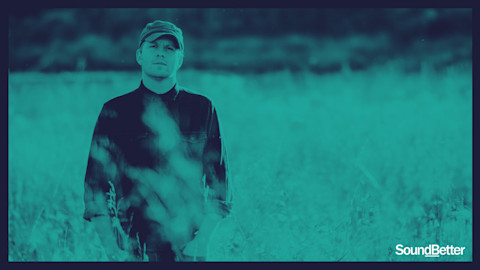Touring with D’Angelo in his ‘Voodoo’-era, this neo-soul crooner learned some invaluable lessons behind a microphone that wasn’t spot-lit, center-stage.
Anthony Hamilton is one of neo-soul's biggest stars, supplying hooks for hip-hop smashes like Jadakiss' existentially minded "Why" and Donell Jones’ “U Know What’s Up”, while racking up Grammy nominations for his own songs, such as 2004's simmering "Charlene" and 2008's gently unfolding "The Point of It All." But before he took center stage, Hamilton spent many years refining his emotionally rich vocals and rigorous musicianship singing in the background. Spotify for Artists asked Hamilton, who's currently working on a follow-up to his 2016 album, What I'm Feelin', to reflect on the lessons he learned while singing in the church with D'Angelo. Turns out he’s got a few nuggets of wisdom for up-and-coming singers.
Spotify for Artists: What was your first background singer gig?
Anthony Hamilton: My first background singing gig was actually in the church—being a part of the choir. My first backup singing gig in my professional music career was singing with D'Angelo [during the Voodoo era].
What lessons did you learn from singing in church?
Being in the church, and being a part of the choir, you had to be willing to be part of the whole family, the whole blend, the whole movement. It wasn't just about you; it was about the family. It was about blending in and making one sound powerful enough to touch many people. That was very important—learning that even though it's not all only about you and your voice, you can express yourself.
What did you learn from your experiences with D'Angelo?
Working with D'Angelo was like going to Harvard. You had all these different musicians who were amazing—Roy Hargrove, Jacques Schwarz-Bart, Russell Gunn, ?uestlove. I met [singers like] Angie Stone and Bilal—so many great voices. They had sung background vocals on a level that I had never experienced, and it was a little intimidating. But once you get over that, you know that you're in a real moment where you can learn a lot.
I learned that you can have your own personality, you can have your own way of interpreting what [the lead singer] is feeling, but you have to understand what he's feeling and pay attention. You can't lead if you can't follow, and I learned that. Being in the background was just as important as being in the front. You bring the song to life every single night, and if D'Angelo didn't have it, it was our job to pick him up and make it happen, and make the fans feel like he was at his best.
You're a little bit like a doctor, and a little bit like a stuntman. If we needed to rescue him, we put a little extra on it. If we needed to dance more because his energy was not up to where he wanted it to be, we knew to go in. We could read. You learn to read the captain: "OK, I see where he is, I hear his voice, I know when his voice is strong, I know when his voice is not." And at certain points, we would just do our thing, and he would give us a look like, “I appreciate that." It was a great experience. I learned how to survive out there, and how to help the leader, how to help them survive. It was awesome. I graduated that thing. That's my Harvard.
How did those experiences affect your pursuit of singing as a profession?
It allowed me to see what made the fans really react—certain notes, certain melodies, certain inflections that you put into a song, or the way you deliver a verse or those moments where the music gets softer. You learn what moves fans. And you put that into your songs, you put those live moments into your songs. Because you know you have to recreate that and you want it to feel just as beautiful as what you experienced.
I learned what a great musician sounds like, and what a great musician has to have. Not just the talent, but a willing spirit—and a humble enough spirit to want to listen. That goes a long way when you're building a chain. You don't want a lot of leaders, you don't want a lot of people who feel like they're more important, or that their way is the best or only way.
What should backup singers who are working now keep in mind as they're pursuing their solo career?
You have to be able to endure hard hours: long hours of rehearsals, long hours of travel. You have to be willing to sacrifice whatever [else] you feel like is important at that time. [Performing] becomes the most important thing.
Learn how to save your money. That's very important. Some days, the meals at the venues are not that great, so you end up going out, or you end up buying [things] if you're not prepared and don't have everything you need. So you end up spending your per diem and your [own] money, and you end up having to overwork and take gigs that you normally wouldn't have to take when you could be resting your voice.
You find out who you are, too, being in the background. "Am I really a lead singer? Am I really ready? Can I really do what I just saw this amazing man do—every single night at that same capacity?" You learn that, if your ego's not in the way.
It seems like surrendering your ego is essential not only for being in the background, but also eventually for going solo, since music is such a collaborative art form.
Yeah. And the people that work with you can feel when your ego's on a thousand, or if we're floating on the same frequency. That's important. I like to make everybody in my camp feel very, very comfortable. I've seen some other camps—I don't call any names—but the lead never speaks to [the background singers]. They probably don't even know their names, they probably could never call them. But I make sure that I'm accessible. [In] my band, each member can call me directly.
Any final pieces of advice?
It's OK to be a background singer. Everybody's not made to lead, and if you feel that you're stronger at adding to somebody else than making a mess on your own, then you should make the proper decision and take your journey into your own hands. Don't let anybody force you into something that you know you may not be your best at. Lisa Fischer's one of the best background singers ever. She did a solo thing and she was great at it, but she's back [singing backup] and she makes everybody sound amazing. And she still has a home. If you can do both, that's good, but if just being a background singer is what you're great at? It's OK.
*This interview has been edited and condensed for clarity
—Maura Johnston
Popular Stories
video
How Julia Wolf Made It




